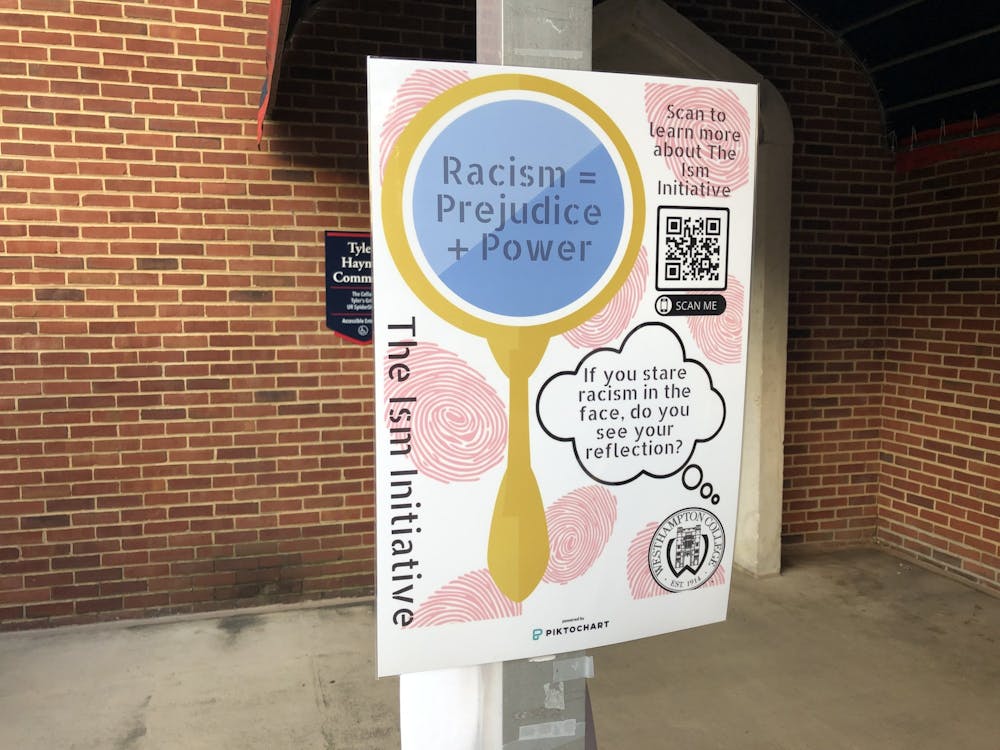The first-year class president of the Westhampton College Government Association and the members of her cabinet recently implemented the “-Ism Initiative,” a program that aims to educate students and faculty members on how to cultivate a culture of respect for marginalized groups on campus.
“It’s a respect thing, learning how to respect people,” said Gabrielle Armon-Wickers, who spearheaded the initiative. “We’ll be able to provide you all with links and articles, where you can just tap on your phone and go ahead and educate yourself like that.”
The program aims to address various -isms and phobias, such as racism or Islamophobia, that pertain to the oppression of marginalized groups, Armon-Wickers said.
She and the members of her cabinet created and planned the initiative in the fall semester.
They put up posters that relate to a particular -ism or phobia around campus. The posters use eye-catching taglines such as "Got racism?" and have QR codes that link directly to a website created by Armon-Wickers and the members of her cabinet. This website acts as a central hub for the initiative, containing articles and videos about the -isms and phobias the initiative is addressing.
“I thought about how Richmond as a school operates,” Armon-Wickers said of how the idea came to her, “and we operate a lot with posters and visual arts, basically, here on campus.”
She cited Tyler Haynes Commons as an example of a place on campus with many visuals and posters.
The first series of posters, put up around campus on Feb. 1, relates to racism. The code on these posters directs to the website, which contains a student-made film offering insights into life as a black student at the University of Richmond, the Harvard implicit bias test and other informative pieces that address racism both at UR and in society as a whole.
Armon-Wickers said she hoped the interactive nature of the initiative would help engage students and faculty members at UR who needed education on these topics. She and her cabinet are “betting on curiosity,” she said.
WCGA plans to keep the racism posters up for two to three weeks, Armon-Wickers said. Afterward, the initiative will address various other prejudices, such as classism, ableism, sexism and homophobia, she said.
Armon-Wickers plans to continue the initiative throughout her four years at UR, she said.
“I want to be able to make this as much of a legacy as possible,” she said.
Enjoy what you're reading?
Signup for our newsletter
Armon-Wickers said it would not be feasible to cover all the -isms and phobias that she and her cabinet wanted to address in just one year.
The Office of Common Ground, the Office of Multicultural Affairs and Disability Services aided WCGA in the planning process.
Glyn Hughes, director of Common Ground, said they had met with Armon-Wickers to discuss her ideas and offer encouragement and guidance.
“Whenever we see people who have initiative,” Hughes said, “we want to kind of nurture that.”
Hughes said Common Ground must take actions such as sponsoring the -Ism Initiative in order for UR to become a more diverse and inclusive place.
Additionally, Hughes emphasized that although Common Ground communicated with her throughout the planning process, this was Armon-Wickers’ initiative.
Despite the level of planning and creativity that went into the project, some students question how successful it will be.
“People who are interested in it will utilize it,” said senior Nicole Walker, “but people who don’t care -- which is generally the population we need to reach -- they’re not going to do anything with it.”
Walker added a caveat to this, saying she was impressed by how many of the posters she had seen up. This easy access may aid the initiative in its goals, she said.
Senior Georges Leconte echoed this point. He said the initiative was a great starting point, but it might not reach the groups that were “propagating these issues.”
Leconte charged UR administrators, rather than WCGA or any student, with taking the necessary next steps.
“I think the university really needs to ask itself the question of ‘How do we reach the groups that aren’t reaching out to us?’” he said.
In response to the racial slur written on her dorm room door in late January, as well as other racist events on campus, Armon-Wickers said her perspective on the initiative had not changed.
She said she did not feel discouraged in her mission.
“I don’t know if that epithet was meant to make me afraid or anything,” she said, “but it didn’t.”
Contact news writer Alan Clancy at alan.clancy@richmond.edu.
Support independent student media
You can make a tax-deductible donation by clicking the button below, which takes you to our secure PayPal account. The page is set up to receive contributions in whatever amount you designate. We look forward to using the money we raise to further our mission of providing honest and accurate information to students, faculty, staff, alumni and others in the general public.
Donate Now



